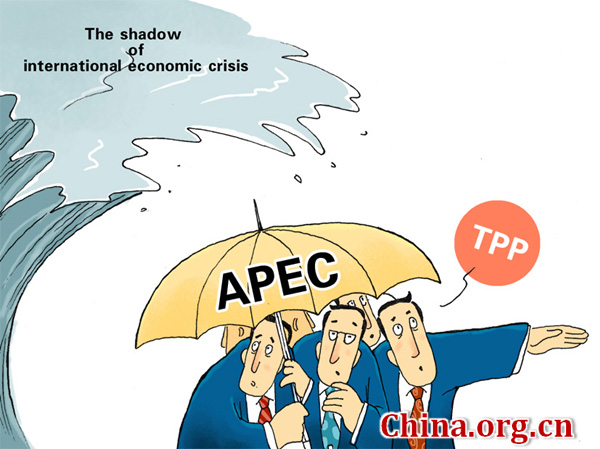Successes of China's economic diplomacy
- By John Ross
 0 Comment(s)
0 Comment(s) Print
Print E-mail China.org.cn, November 17, 2014
E-mail China.org.cn, November 17, 2014
|
[By Zhai Haijun/China.org.cn] |
To China's west, the key infrastructure project is a modern "Silk Road." The two ends of this would be anchored by the world's largest industrial producing region, which is now China, and the world's most important energy producing region – the Middle East. These create a link aiding the development of Central Asia, and thereby growth in Asian Russia.
Infrastructure development is also crucial in South East Asia. Even with modern technology it is impractical to build major transport links directly across the Himalayas between China and India – a key reason a "maritime Silk Road" is required as well as the overland one. But in South East Asia there are large numbers of possibilities for railway and road construction, in which China will be crucial.
The most sustained and rapid growth possible in the developing Asian region will, in turn, be the best support for other economies. South Korea evidently intends to tie itself into this development – as shown by its free trade agreement with China. Even Abe seems to have decided that confrontation with China was shooting Japan's own economy in the foot and has recently sought to reduce tensions.
This does not mean no geopolitical problems remain – in addition to economic challenges. Given the very different levels of economic development in the Asia-Pacific region, China's proposal for a Free Trade Area for Asia and the Pacific (FTAAP) is the best way forward – thereby also allowing the Asia- Pacific region to maximally propel the global economy. The United States, in contrast, in addition to trying to block the AIIB, has been attempting to counterpose a narrower Trans Pacific Partnership, with rules which benefit primarily itself, and excluding China – the world's largest goods trading nation. This latter project, centred on rather stagnant economies and with a structure rigged to favour the United States, would be a substantially worse choice for the world economy than China's FTAAP.
Given these issues it is significant that China was selected to host the 2016 G20 summit – the 2015 summit was already fixed for Turkey. The G20 host country leads the preparatory work and agenda setting for the summit. China's desire to hold the summit therefore indicated it wished to play a global agenda setting role. It is, consequently, strongly to be hoped that China will be able to carry over the effective work already seen at the APEC summit into the G20.
The next two years will therefore see a major test not only of China's economic strategy but of its diplomacy.
The writer is a columnist with China.org.cn. For more information please visit: http://www.china.org.cn/opinion/johnross.htm
Opinion articles reflect the views of their authors, not necessarily those of China.org.cn.







Go to Forum >>0 Comment(s)